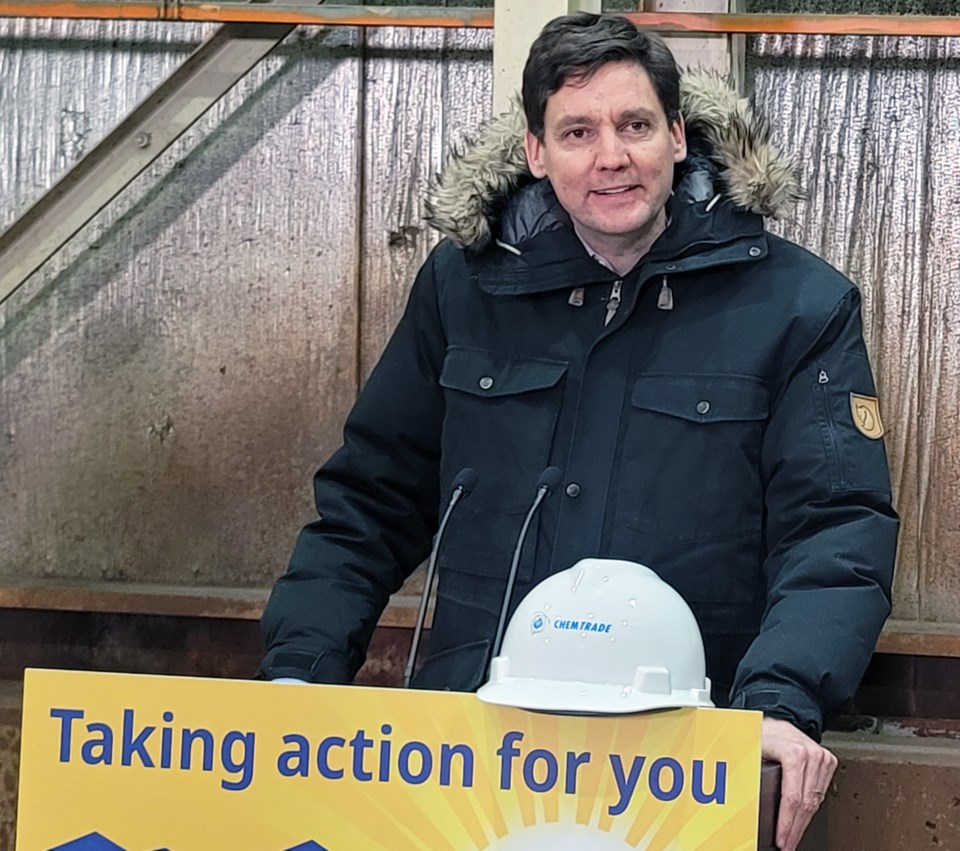A collaborative project to turn clean energy hydrogen and use it to replace natural gas used by Canfor’s Intercon Pulp Mill was announced Tuesday afternoon by Premier David Eby.
Waste hydrogen produced through hydrolysis by Chemtrade as a byproduct of making sodium chlorate will be refined and compressed to provide a low-carbon fuel source that will supply up to 25 per cent of the gas needed to heat the boiler of the adjacent mill used to make pulp and paper products.
The project, which also involves Fortis BC, will be funded by Chilliwack-based Teralta Hydrogen Solutions and is expected to create dozens of construction jobs and several permanent operational positions at the Chemtrade facility next to the pulp mill.
It’s expected to produce an average 500,000 gigajoules of clean energy and reduce carbon emissions by 700,000 tonnes over the several-decades lifespan of the project. The electolyzers that will create the hydrogen will run using grid electricity.
Eby said the burgeoning global market for hydrogen is estimated to grow to $87 billion by 2030 and $305 billion by 2050 and he said Prince George is getting in on the ground floor of that market as a potential hydrogen hub.
The Teralta project is among 50 domestic and international projects related to hydrogen currently under consideration by the province.
“The reason for that is hydrogen is one of our best bets to decarbonize one of our hardest-to-decarbonize sectors, where we’re using natural gas or fossil fuels,” said Eby. “Hydrogen enables companies in Asia potentially to decarbonize their steel-making operations, which is one of the major interests for export here in British Columbia.
“Clean hydrogen opens a world of opportunities for our province that we’re not taking advantage of yet. And are right there for us. It may be the first project of its kind but it certainly won’t be the last.
Eby said the province has created an office to streamline approval of clean energy and major projects office, to ensure regulatory processes and permits don’t delay projects.
Teralta CEO Simon Pickup acknowledged that the province’s regulatory amendment in 2021 cleared the way for his company’s hydrogen program.
“We will be able to provide clean hydrogen for Canfor to reduce their emissions, reduce operating costs and showcase a new model for making hydrogen actually viable for industrial users,” said Pickup.
Josie Osborn, Minister of Energy, Mines and Low Carbon Innovation, said Prince George is ideally positioned geographically to attract investment in hydrogen and pioneer new technologies the world needs to build a low-carbon economy and meet climate goals.
The city has been identified as the site of $3 billion megaproject to produce green hydrogen for export proposed by Australian mining giant Fortescue. Eby told the gathering at the Chemtrade announcement the head of Fortescue has already met with Mayor Simon Yu and Lheidli T’enneh chief Dolleen Logan to discuss the project, which would require one gigawatt of power to operate, equivalent to the entire power production of the Site C dam once it’s up and running.
Fortescue is working with HTEC of Vancouver to develop the project and in September filed Initial Project Description with the BC Environmental Assessment Office. The province has set up a task force to examine the potential impact of such a project on B.C.’s electrical grid.
Osborne also pointed to the Tse’khene energy hub, a $7 billion project clean hydrogen export project at Kerry Lake, 90 kilometres north of Prince George, a proposed partnership between Mitsubishi and the McLeod Lake Indian Band.
“Prince George is a crossroads,” said Osborne. “The location, in terms of having railways, the highways and the proximity to Prince Rupert and the port for export. The technology innovators are already here and we have the welcoming of the First Nation and the city and it’s kind of like all those pieces come together.”


